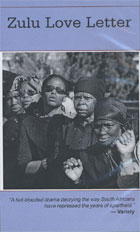
Zulu Love Letter 2004
Distributed by California Newsreel, Order Dept., PO Box 2284, South Burlington, VT 05407; 877-811-7495 (toll free)
Produced by Jacques Bidou, Bhekizizwe Peterson, Marianne Dumoulin
Directed by Ramadan Suleman
VHS, color, 100 min.
Sr. High - Adult
African Studies, Drama, Human Rights, Postcolonialism, Sociology
Date Entered: 08/03/2007
Reviewed by Thomas J. Beck, Auraria Library, University of Colorado at DenverThandeka is a mess! On this, her family and friends would agree.
She's a journalist, but she's had writer's-block for some time and can't work. Her daughter Mangi is deaf, but she has never bothered to learn sign language. Their relationship is strained, not only because Thandeka can't sign, but because she continues to make promises to the young girl that she never keeps. She is happy one moment, and angry and combative the next. There is frequent conflict between her and her father, who feels she is a bad mother and who resents her erratic behavior. Her relationship with ex-husband, Moola, is little better. He still loves her and treats her with great tenderness and patience, but she is as likely to turn on him angrily as she is to embrace him. She is dating another man, but she seems to care little about him. She spends much of her time drinking. At one point she blacks out and has to be hospitalized.
Yes, Thandeka is a mess, but there is a reason why.
This film is a dramatization set in post-Apartheid South Africa. It addresses the emotional scars that many people, such as Thandeka, still bear from the Apartheid era, as well as the influence that racists and racism still have on that country, even though black majority rule is now more than a decade old.
Thandeka's problems are rooted in a terrible trauma the she and her photographer suffered in the past, during the last "state of emergency" imposed by the Apartheid government. Both witnessed the murder of a young activist, Dineo, by three policemen. After Thandeka wrote about this in her newspaper she and her photographer were arrested and tortured. She has never been able to come to grips with those terrible events, though they happened years ago. Her trauma is compounded by the fact that her friends, family and countrymen seem all too willing to forget about them and the other crimes of the Apartheid era. Too many South Africans would like to forget the past, and act as if it never existed. They would like to put the pain of it behind them, but many, like Thandeka, can't do that. She and the others like her remember the numerous crimes that were never brought to justice, and they know these continue to torment the victims and their families.
Thandeka's own pain is brought into sharp focus when she is visited by Dineo's mother, Me’Tau. The old woman has come to ask for her help. Dineo's body was disposed of by the policemen that killed her. Me’Tau knows who these men are, and has asked them to tell her where Dineo’s body is so she can retrieve it and lay it to rest in the proper way. She has also asked them to admit their crimes to the Truth and Reconciliation Commission, a body set up by the current South African government to investigate, and wherever possible rectify, the crimes of Apartheid. The three men refuse to tell her anything or to admit to what they've done. She then decides to come to Thandeka and ask for help in finding her daughter's body. Thandeka is more than happy to do so, hoping that by doing what she can to right this wrong she might be able to exorcise some of her own demons in the process.
As they pursue their investigation both women conclude, though at different times, that they can only find closure on this terrible chapter in their lives by testifying before the Commission themselves. The policemen are frightened by their plans and their investigation, and try to intimidate them. These men still have much of the power and influence they enjoyed during the Apartheid era, and can use it to deadly effect. The crimes and menace of Apartheid are not all in the past. Some are very much a part of the present.
In the process of confronting her own trauma, and seeking answers about Dineo's death, Thandeka and her family pay a very high price for her efforts, one that will cause them even more sadness and pain. Despite all of this, or perhaps because of it, Thandeka finds in herself a strength and resolve that had previously eluded her. She isn’t a mess anymore, or at least so much of one! The viewer now has hope that she can face her life and her past and go forward. Though this film concludes with anything but a "happy ending," it does give some hope that both Thandeka and her country will, through their own determination and efforts, find some measure of peace and justice at last.
Thandeka is played by Pamela Nomvete Marimbe, whose performance gives the entire film its energy and drive. Her co-stars give performances that range from the very good to the merely competent, but it is Nomvete Marimbe that holds the viewers attention. She perfectly captures Thandeka’s rage and fear, as well as her longing for both personal contentment and national justice. The film is heavily laden with symbolism, especially in those segments where we are allowed to share Mangi’s dreams, both sleeping and awake. This symbolism may confuse some viewers, as might the South African accents of most of the cast. The picture and sound qualities are good, though in some scenes the lighting is inadequate and the viewer has to strain to see the action. The dialogue is almost entirely in English, with some Zulu added. An excellent film!